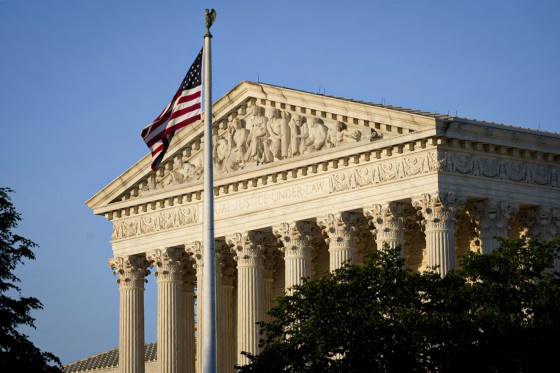
The important 1984 precedent gave federal bureaucrats flexibility to interpret the law when the language is unclear.

In practice, the court's earlier ruling meant that both Democratic and Republican presidents could take advantage of the flexibility it gave to agencies in implementing new regulations on a wide variety of issues. Alex Brandon / AP file
June 28, 2024, 2:24 PM UTC / Updated June 28, 2024, 4:07 PM UTCWASHINGTON — The Supreme Court on Friday overturned a 40-year-old precedent that has been a target of the right because it is seen as bolstering the power of “deep state” bureaucrats.
In a ruling involving a challenge to a fisheries regulation, the court consigned to history a 1984 ruling called Chevron v. Natural Resources Defense Council. That decision had said judges should defer to federal agencies in interpreting the law when the language of a statute is ambiguous, thereby giving regulatory flexibility to bureaucrats.
It is the latest in a series of rulings in which the conservative justices have taken aim at the power of federal agencies, including one on Thursday involving in-house Securities and Exchange Commission adjudications. The ruling was 6-3, with the conservative justices in the majority and liberal justices dissenting.
“Chevron is overruled,” Chief Justice John Roberts wrote in the majority opinion. “Courts must exercise their independent judgment in deciding whether an agency has acted within its statutory authority.”
He said that the ruling does not cast into doubt prior cases that relied on the precedent, but going forward lower courts “may not defer to an agency interpretation of the law simply because a statute is ambiguous.”
Liberal Justice Elena Kagan wrote in dissent that a “longstanding precedent at the crux of administrative governance thus falls victim to a bald assertion of judicial authority.”
The ruling would hobble agencies with specialized scientific knowledge that will now be second-guessed by federal judges, she said.
“It puts courts at the apex of the administrative process as to every conceivable subject — because there are always gaps and ambiguities in regulatory statutes, and often of great import,” she added.
“What actions can be taken to address climate change or other environmental challenges? What will the nation's health-care system look like in the coming decades? Or the financial and transportation systems? What rules are going to constrain the development of AI?” Kagan wrote.
At the time it was decided, Chevron was a win for the deregulatory efforts of the Reagan administration. It was initially seen as a benefit to Republican officials in the administration who wanted to make regulations less onerous on businesses.
In practice, the ruling meant that both Democratic and Republican presidents could take advantage of the flexibility it gave to agencies in implementing new regulations on a wide variety of issues.
But Chevron over the years became increasingly criticized on the right because of the claim that it gives too much power to agency bureaucrats to interpret the law.
Groups on the left, including environmental activists, have defended Chevron, in part because it gives leeway to address issues like climate change.
Vickie Patton, general counsel of the Environmental Defense Fund, warned in a statement that the ruling is an impediment to ensuring clean air and water as well as climate policies.
“It undermines vital protections for the American people at the behest of powerful polluters,” she added.
The underlying issue before the justices concerned a federal regulation that would require fishing vessel operators to help fund the cost of collecting data that would assist with fishery conservation and management.
Roman Martinez, a lawyer for some of the challengers, said the court “has taken a major step to preserve the separation of powers and shut down unlawful agency overreach.”
Operators of fishing vessels active in the herring fishery off the Atlantic coast challenged the 2020 rule applying to New England fisheries. Lower courts in both cases ruled for the federal government.
The challengers argued that the National Marine Fisheries Service, the federal body that oversees ocean resources, did not have authority to issue the regulation under the 1976 Magnuson-Stevens Fishery Conservation and Management Act.
The rule implemented a monitoring program that vessel operators are required to fund. The challengers said that operators would have to pay up to $710 a day at certain times for independent observers to board their vessels and monitor operations. The cost would be burdensome for small owner-operators, the challengers said.
The fisheries dispute is one of several in the current court term in which the justices are considering attacks on federal agency power led by business interests and the conservative legal movement.
The Trump administration had embraced the war on “deep state” agency power, selecting judicial nominees in part based on their hostility to the federal bureaucracy. The Supreme Court’s conservative majority includes three Trump appointees: Neil Gorsuch, Brett Kavanaugh and Amy Coney Barrett.
The Supreme Court has already addressed the issue of agencies exerting broad power without clear congressional instructions from another angle in recent rulings that struck down President Joe Biden’s federal student loan debt relief plan, blocked his Covid vaccination-or-test requirement for larger businesses, and curbed the EPA’s authority to limit carbon emissions from power plants.
Those cases did not rely on the Chevron analysis but instead said simply that on issues of broad national impact, there needs to be an explicit authorization from Congress, an approach known as the “major questions doctrine.”
Lawrence Hurley is a senior Supreme Court reporter for NBC News.